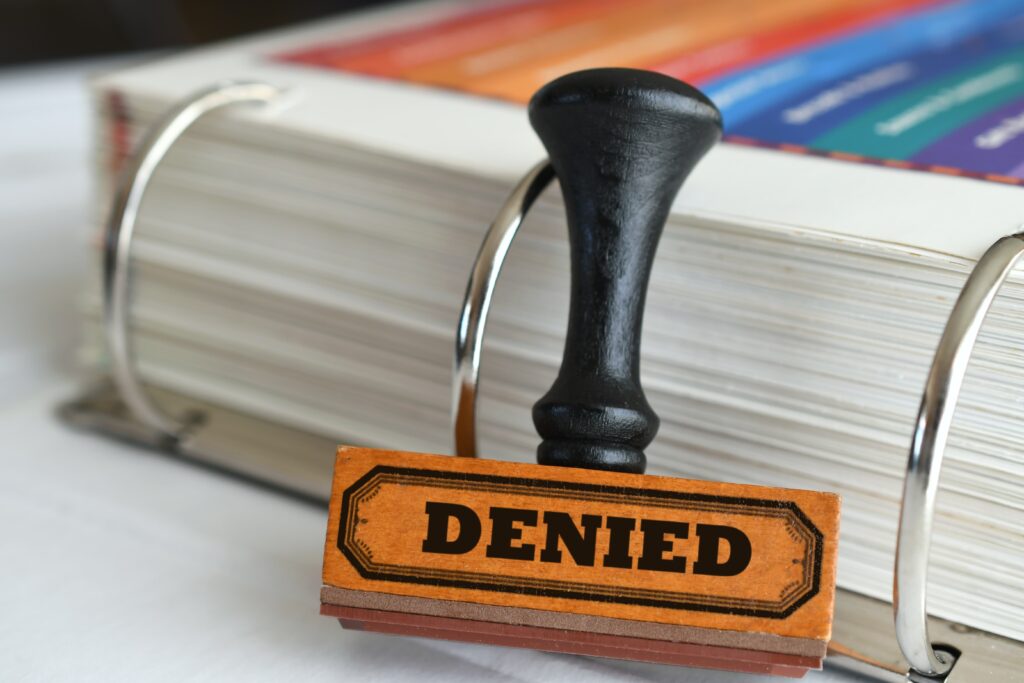Your career as a dentist is built on precision, physical control, and years of technical training. You have invested in your practice, and you purchased individual disability insurance (IDI) to protect that investment.
So, when an injury, illness, or condition jeopardizes your ability to practice, you turn to the disability insurance policy you invested in, often early in your career. These policies are marketed to dental professionals as own-occupation protection. In theory, they promise to replace your income if you can no longer perform the specific duties of your occupation. But in practice, many dentists face a very different reality.
Disability insurers routinely minimize or deny valid claims. They challenge your diagnosis, misinterpret your policy language, or insist that you can still “work” in some capacity, even if you can no longer treat patients. They may claim your disability is “partial,” that you are not totally disabled, or that your business income disqualifies you from benefits.
At Sandstone Law Group, we know these strategies because we have spent years dismantling them.
Table of contents
- Understanding Disability Policy Terms
- Why Dentists Face Unique Challenges in Disability Claims
- “Own-Occupation” Coverage for Dentists
- Common Disabling Conditions for Dentists
- Tactics Insurers Use to Deny Dentist Claims
- Which Insurers Deny Dentist Disability Claims Most Often?
- Should You Appeal Your Denial?
Understanding Disability Policy Terms
| Term | What It Means | Why It Matters to Dentists |
| Own-Occupation | You’re disabled if you can’t perform your specific profession | Even if you can consult or do admin work, you likely still qualify if you can’t treat patients |
| Any-Occupation | You're only disabled if you can't work any job reasonably suited to you based on your education, training, and experience. | More restrictive; often used to deny valid claims |
| Residual Disability | You can still work part-time but have lost income due to disability | Often exploited to reduce full payouts or disqualify total disability |
| High-Limit Policy | Coverage with large monthly benefits, usually bought by high earners | These are scrutinized more and denied more frequently |
Why Dentists Face Unique Challenges in Disability Claims

Dentists are held to a different standard than most workers. Your ability to safely and effectively perform procedures depends on fine motor control, musculoskeletal endurance, and full cognitive alertness. Yet disability insurers routinely minimize the unique demands of dental work.
Dentists often invest in high-limit disability insurance policies to protect years of education, practice ownership, and future earning potential. But the same high-value nature of these policies puts a target on your claim. Insurers may delay, dissect, or distort your condition to avoid paying out the full benefit—especially if they know your policy guarantees six-figure monthly coverage.
We have seen insurers claim:
- You are “not disabled” because you can perform admin or managerial duties, even if you can no longer treat patients chairside.
- Your pain, fatigue, or cognitive symptoms are “subjective” and not supported by objective tests.
- You are still earning partial income, so your disability is not “total,” even when your production has dropped significantly.
These are intentional mischaracterizations designed to protect the insurer’s bottom line. We challenge those tactics at every level.
“Own-Occupation” Coverage for Dentists
Many dentists carry IDI policies that promise “own-occupation” protection, meaning you are entitled to benefits if you can no longer perform the core duties of your specific profession, even if you could technically work elsewhere.

But in practice, insurers often distort that definition:
- They argue that your “occupation” includes business ownership, not just clinical work.
- They claim you can still consult or supervise, so you are not “totally disabled.”
- They exploit residual income clauses to reduce or eliminate benefits.
We have handled these arguments hundreds of times. We work with vocational experts, industry-specific data, and medical specialists to clearly define your role, document your impairment, and force the insurer to honor the coverage you paid for.
Common Disabling Conditions for Dentists
Dentistry is physically demanding and often performed in constrained, repetitive postures under high stress. The most common disabling conditions we see in dentist claims include:
Musculoskeletal Disorders
Years of leaning over patients, gripping instruments, and standing or sitting in static postures for prolonged periods can take a serious toll on the body. Over time, repetitive stress and cumulative strain can lead to a range of musculoskeletal conditions that directly impair a dentist’s ability to practice safely and effectively.
Common diagnoses include:
- Cervical and lumbar disc herniations or degeneration – causing nerve compression, chronic pain, and limited range of motion
- Carpal tunnel syndrome and cubital tunnel syndrome – leading to numbness, tingling, and hand weakness
- Rotator cuff injuries, shoulder impingement, and bursitis – reducing mobility and strength in the upper extremities
- Tendonitis and tenosynovitis – often affecting the wrists, elbows, or fingers due to repetitive fine motor work
- Osteoarthritis and inflammatory arthritis – especially in the neck, hands, and knees
- Thoracic outlet syndrome – producing pain, tingling, or circulation issues in the arms and hands
- Chronic myofascial pain and muscle fatigue – making sustained precision movements difficult
Even minor tremors, reduced grip strength, or chronic pain can make procedures unsafe for patients, triggering a valid disability under your Individual Disability Insurance policy.
Cognitive and Neurological Impairments
Dentists rely on focus, decision-making, and precise coordination. Neurological disorders such as Parkinson’s disease, multiple sclerosis, post-concussive syndrome, peripheral neuropathy, or long-COVID complications can lead to:
- Cognitive fog, memory issues, and reduced executive function
- Delayed reflexes and hand-eye coordination problems
- Involuntary tremors or muscle weakness
- Visual processing delays and depth perception problems
- Mental fatigue that impairs patient safety
Insurers often downplay these symptoms as “mild” or “non-disabling.” At Sandstone Law Group, we partner with treating physicians and medical experts to build compelling legal and clinical evidence that clearly shows how these conditions affect real-world functioning and patient care responsibilities.
Mental Health and Burnout
Dentistry ranks among the top professions for stress-related disorders, including:
- Anxiety and depression
- Burnout from overwork and patient care demands
- PTSD following medical errors or traumatic clinical events
Despite the clinical legitimacy of these conditions, insurers frequently deny claims by labeling them “self-reported.” We challenge those denials with expert-backed evidence.
Side Effects from Treatment or Medications
Sometimes, the disability is not from the condition—it is from the treatment. Medications for pain, autoimmune issues, or mood disorders may cause:
- Fatigue
- Impaired motor control
- Cognitive slowing or coordination issues
In a profession where precision equals safety, these side effects can justify a disability claim.
Tactics Insurers Use to Deny Dentist Claims

Over the years, we have seen a consistent pattern of tactics used to delay, diminish, or outright deny valid dentist disability claims:
Independent Medical Examinations
One of the most common tools insurers rely on is the Independent Medical Examination, or IME. Despite its name, these exams are rarely independent. Dentists are often sent to physicians who are not specialists in musculoskeletal disorders, neurology, or even occupational medicine, let alone professionals who understand the specific physical and ergonomic demands of dentistry. These doctors frequently conduct brief, superficial assessments that fail to capture the realities of what it takes to safely practice clinical dentistry. The resulting reports often minimize or outright dismiss the dentist’s reported symptoms, giving the insurer cover to deny the claim.
Residual Disability Clauses
Another frequent tactic is the distortion of residual disability clauses. Insurers may argue that because you retain some capacity to manage your practice, perform administrative duties, or consult on patient cases, you are not “totally disabled.” This argument ignores the central fact that most own-occupation policies are designed to protect your ability to treat patients, not simply generate income. By conflating business ownership with clinical function, insurers attempt to obscure the real nature of your disability and reduce or eliminate your benefits.
Surveillance and social media monitoring
Surveillance and social media monitoring are also heavily used against dentists. Insurers may hire investigators to record you performing ordinary tasks, walking your dog, attending a social event, or running errands. These brief snapshots are then exaggerated to suggest that you are capable of returning to full-time practice. The context is ignored, and the complexity of your condition is reduced to a misleading image or video.
Delays
Insurers also rely on endless delay tactics. They request the same records multiple times, demand supplemental forms without a clear explanation, and cycle through representatives so that your claim is never in the hands of one consistent reviewer. The goal is to exhaust you into either accepting a reduced settlement or abandoning the claim entirely.
Low Settlement Offers
When all else fails, insurers often present lowball settlement offers, which are lump-sum payouts that represent only a fraction of what your policy is worth. These offers are often made when you are financially and emotionally vulnerable, hoping you will accept less than you deserve just to move on.
At Sandstone Law Group, we are deeply familiar with every one of these tactics. We know how to stop them, whether through negotiation, strategic appeals, or litigation. We do not let insurers manipulate your policy, mischaracterize your profession, or minimize your impairments.
Which Insurers Deny Dentist Disability Claims Most Often?
Many dentists purchase individual disability insurance early in their careers—often from well-known, “trusted” providers. But those same insurers have often developed reputations for aggressively denying high-value dentist claims.
| Insurer | Common Denial Patterns Seen in Dentist Claims |
| Guardian/Berkshire | Own-occupation language may be challenged; may argue clinical + business duties mean not totally disabled |
| Unum | IMEs with generalists; may deny based on “subjective” pain or fatigue symptoms |
| Principal | Residual income clauses may be misapplied to reduce benefits |
| The Standard | Surveillance-heavy; may exploit social media to challenge claims |
| MetLife | May deny based on vague exclusions; multiple rounds of paperwork requests |
| MassMutual | May cause delays and do vague denials (common in mental health and neurological claims) |
Should You Appeal Your Denial?

There is no federal law requiring you to appeal an IDI denial before filing suit. That obligation only applies to ERISA-governed, employer-sponsored LTD policies. As a dentist with a privately purchased policy, you are not required to exhaust internal appeals. A poorly executed appeal can damage your case. Insurers often use appeal submissions to lock in harmful language, dismiss favorable evidence, or use your appeal to try and clean up their claims handling mistakes while still upholding your denial. That is why it is critical to consult legal counsel before making your next move.
Why Sandstone Law Group?
You deserve a law firm that understands your dental career, all of your responsibilities, and the legal leverage it takes to make insurers deliver on their promises.
At Sandstone Law Group…
- We Understand Dentists—Because We’ve Walked This Path with Them: At Sandstone Law Group, we understand the unique physical and cognitive demands of dentistry—and how even subtle impairments can threaten your ability to practice safely. We've represented general dentists and specialists in disability claims involving countless conditions such as cervical disc disease, tremors, and cognitive decline. Whether your policy is with Guardian, Berkshire, Principal, or another major carrier, we know how to align real-world clinical duties with the language of your disability contract.
- We Listen First: From your time speaking with our attorneys, Kyle and Erin, we take the time to understand your daily responsibilities as a dentist and your policy. You will not be rushed or handed a generic plan. We know your case is personal, and we approach it with the same care and precision you have given your patients.
- We Know the Insurer’s Playbook: We have gone head-to-head with every major disability insurer in the country, including MetLife, Guardian, Unum, The Standard, and MassMutual. We know their tactics and we know how to dismantle them.
- We Are Prepared for Litigation: Unlike firms that solely concentrate on ERISA group plans, we focus heavily on IDI litigation. We know how to use bad faith laws to pursue punitive damages, emotional distress compensation, and full discovery, because private policies give us room to fight hard.
- We Win for Dental Professionals Like You: Our firm has recovered millions in benefits and legal damages for various types of medical professionals. Whether your policy promises “own-occupation” protection or includes layered coverage for partial or residual disability, we hold insurers accountable to the letter of the contract.
- We Treat Clients Like Partners: You are a high-level professional. We treat you like one. That means proactive communication, transparent strategy, and a legal relationship built on mutual respect. When you hire us, you are gaining a dedicated team.
Contact Sandstone Law Group
If you are a dentist in California, Arizona, or any other state, and your private disability insurer is denying, delaying, or underpaying your claim, you do not have to accept it. We represent dental professionals across the country who are being stonewalled by their carriers. Whether your coverage promises own-occupation protection, residual benefits, or high-limit income replacement, we are prepared to fight for every dollar you’re owed.

If your policy promises “own-occupation” coverage, residual disability benefits, or total income replacement, our firm is prepared to hold the insurer accountable to every word of that contract. We understand the high-level skill and physical intensity required in your field, and we know how to prove that even subtle impairments can fundamentally disrupt your ability to treat patients.
At Sandstone Law Group, we treat your case with the urgency and respect it deserves. We will identify where the insurer went wrong and build a claim strategy grounded in your medical reality and your professional role. Whether we negotiate a resolution or take your case to court, we bring the experience and firepower needed to secure the outcome you deserve.
Contact us at (602) 615-0050 to schedule a confidential consultation. Let us protect your livelihood, hold the insurer accountable, and restore the stability you have worked so hard to earn.